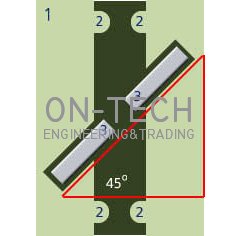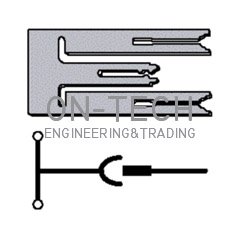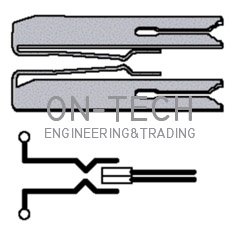LSA-PLUS contact technology
Last updated: 14 Jan 2016 | 4606 Views |

LSA-PLUS® Quick Connection System offers an integrated Insulation Displacement Connection (IDC) system for line connections and operational circuits
Lötfrei - Solder-free
Schraubfrei - Screw-free
Abisolierfrei - Stripping-free
-
Preiswert - Price and cost effective
Leicht zu handhaben - Less complicated
Universell andwendbar - Universally applicable
Sicher und Schnell - Safe and quick
The LSA-PLUS system, with the LSA-PLUS contact as its smallest functional unit, provides for connection, disconnection, switching and earthing functions in telecommunications applications.
Special attention to maximum contact safety regardless of climatic and ambient conditions, results in a high degree of technical security through a gas-tight, low resistance joint.
A single tool, connects and cuts the wires, to the correct length, in one operation.
Contact behaviour on insertion of wire
|
|
|
| Sectional view of an LSA-PLUS contact showing,
1) Plastic Housing of Module. 2) Mechanical Clamping Ribs. 3) LSA-PLUS wire contact set at 45 degrees | On insertion of the wire the contact are move outwards, as well as
being twisted away from the axis of the wire. During the process the clamping ribs partially distorb the insulation of the wire, and by doing so, create a high level of mechanical stability. | On completion of the insertion action the contacts apply
lateral and torsional forces to the inserted wire. These forces, coupled with the mechanical clamping, create a gas-tight and superior IDC contact |
|
|
LSA-PLUS Contact Types
|
| The Connection contact is a "through" contact with no facility for testing without removal of the terminated wires.
This type of contact only supports basic 3-point, over-voltage protection(Magazine). It does not support over-current protection. |
|
| The Disconnection contact is classified as being of the Normally Closed(NC) type, which facilities monitoring and/or testing without the need to remove terminated wired. This provides a "look both way" feature.
This type of contact supports all types of over-voltage and over-current protection. |
|
| The Switching contact is classified as being of the Normally Open(NO) type, which facilities monitoring and/or testing without the need to remove terminated wired. This provides a "look both way" feature.
This type of contact requires that an accessories, such as a bridging plug, of protection device, be inserted to complete the circuit. This type of contact supports all types of single-pair over-voltage and over-current protection. |
Related content
Manhole
1 Mar 2019
Definition of MDF
21 Dec 2015













